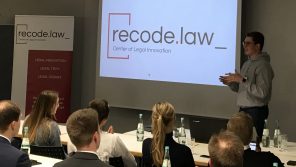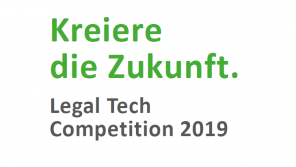by Jan Gilarowski & Karoline Dotterweich
This year, ELTACon 2021 took place online from 29 November to 2 December. The key topic was LEGAL TECH & INNOVATION – From Chan(g)e to chan(c)e. Christina Blacklaws opened the conference with an inspiring Kick-Off-Keynote.
Participants had the opportunity to catch up on the latest developments in various sessions, panel discussions and lectures. Everyone could get involved via a live chat. The attendees, who came from more than 39 countries around the globe, were also able to network and exchange ideas in various video networking sessions.
During the conference, Sina Kreft and Julia Brünjes supervised the different program items.
Please note that the following impressions can not capture all speakers nor topics. For a complete overview, have a look at the ELTACon2021 website.
Listening to Christina´ s and other speeches it became apparent that Legal Tech is a clear priority for law firms and in-house legal departments. This is necessary to maintain and expand its position in the legal market and fit the clients´ expectations.
I. The Issue
Nevertheless challenges remain and adoption is still relatively low. Even in big law, where adoption is most advanced it is used in a relatively small proportion of client work. It is important to create awareness in order to successfully integrate technology in law firms and legal departments.
One reason is a historical lack of IT investment in the legal sector. Many law firms see themselves first as practices rather than business. But they catch up, in the past years law firms had higher percentage growth rates than other areas e.g. FinTechs and InsureTechs.
It is not only about investing in technology but in technology adoption, which is time consuming and limited by the individual itself. The bottleneck of this change is the lawyer and employee as a human being.
This insight leads us to the main topic of Day 1.
II. Chance to change Leadership
Leadership is one of the most important challenges to get your employees in shape for a new era.
The challenge is to create a culture where technology can be successfully adopted. Dr Hariolf Wenzler & Max Gutbrodunderlined this in their session as well. Technical training both at the beginning and on a regular basis is key. It is important and crucial to hire employees who are curious and therefore able to cope with a fast changing environment.
Regardless of how advanced the technology and tools become – in the end it comes down to the human beings who are using it.
The above mentioned only targets employees who are already educated. In order to get one step ahead we also need to focus on the next generation. To accomplish creating lawyers with skills required now and especially in the future we need to change education.
III. Chance to change Education
Holger Zscheyge, president of ELTA, pointed out that the slow pace of bringing Legal Tech to the Law schools is a huge problem. Supporting this statement, Itzik Amiel stressed that the time for change is now. In his opinion we can not wait for the next generation to execute the change.
1. Changing the way we teach
Moreover, the “Digital Study” presented by Tianyu Yuan and Sandra Lühr revealed that legal education lacks in terms of implementing Legal Tech into the curricula. Several speakers demonstrated how to reimagine the way we teach.
Rebecca Williams introduced a new interdisciplinary Law and Computer Science program at the University of Oxford which pairs up students from the two different disciplines. Its main goal is teaching the students how to communicate so that they become bilingual to a point where they can have intelligent conversations to supplement each other.
Malin Männikkö presented the Stockholm Innovation Bootcamp which will take place in January 2022. Students from different disciplines are given a challenge which they should solve through innovation. For her, innovation means empowerment.
Besides that, Denis Ivanov pointed out the importance of not only theoretical, but project based learning. Therefore he initiated various legal hackathons and summer schools. Since too many are happy with the status quo, his advice is to lift the question of how to implement change in the curricula to the government.
2. Changing the way we think
Education does not stop once lawyers leave the law schools. In fact, learning is a never ending process.
Hence, Rebecca Williams pointed out that lawyers need to better recognise the data that is flowing under their hands. There is great potential in the data, but it is wasted as long as it is not used appropriately. A solution is to improve our design thinking. Instead of doing things over and over again, it can be done better and in a more productive way with the help of technology.
Another way to implement change, Itzik Amiel urged everyone to stop thinking like lawyers. Instead, we should learn to take the client’s perspective. Greater flexibility will lead to better outcomes in the long term, for lawyers and clients both.
IV.. Conclusion
There is no blueprint for Legal Tech implementation. In the end it comes down to each individual to start the change.




